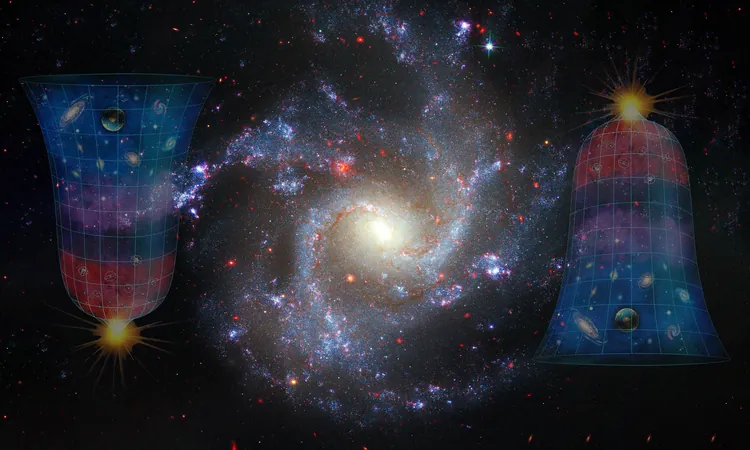
New Insights Suggest Our Understanding of the Universe Might Be Way Off!
2024-12-01
Author: Yan
New Insights Suggest Our Understanding of the Universe Might Be Way Off!
For decades, scientists have been striving to unveil one of the cosmos' most fundamental mysteries: the rate at which our universe is expanding. This rate, known as the Hubble constant, not only helps us understand the formation of galaxies but also offers insights into their potential futures—will they drift apart, or coalesce in unseen ways?
The Hubble Tension Dilemma
Despite the concerted efforts of many brilliant minds, scientists are grappling with what has come to be known as the "Hubble tension." This term characterizes the ongoing discrepancy between various measurements of the universe’s expansion rate, leaving both experts and enthusiasts perplexed.
Physicist Adam Riess of Johns Hopkins University, a Nobel laureate recognized for demonstrating that the universe is expanding at an accelerating pace due to dark energy, has been at the forefront of this debate. He recently stated, “With measurement errors accounted for, we might be facing the real and thrilling possibility that our entire understanding of the universe is incorrect.”
Why is the Hubble Constant So Important?
The significance of the Hubble constant cannot be understated. Discovered by Edwin Hubble, who first noted the retreat of galaxies from us, this constant is pivotal in mapping out the universe's history and estimating its future trajectory. Accurate determination of the Hubble constant has been a core objective for astronomers, especially following the launch of the Hubble Space Telescope in 1990, which significantly refined estimates of the universe's age to approximately 13.8 billion years.
The Role of the James Webb Space Telescope
With the launch of the James Webb Space Telescope (JWST), scientists hoped to find a more precise value for the Hubble constant. JWST's ability to observe the universe in infrared has confirmed previous Hubble measurements. Combining observations from both telescopes has been described by Riess as a powerful step forward, ensuring greater reliability in our cosmic distance measurements.
However, despite these technological advancements, the debate continues. Measurements from the local universe, taken by both Hubble and Webb, indicate one expansion rate, while observations of the ancient universe from the Planck satellite suggest a different rate entirely.
The Innovative Approach of Brenda Frye
In an exciting development, a new approach to measuring the Hubble constant was undertaken by Brenda Frye at the University of Arizona and her international team. They employed gravitational lensing—where light from distant celestial bodies is warped by massive galaxies in the foreground—to analyze a particular cluster of galaxies.
Using this novel method, they identified a Type Ia supernova magnified by gravitational lensing. Their findings returned a Hubble constant value of 75.4 kilometers per second per megaparsec, aligning more closely with local measurements but still creating a rift with values from early cosmic observations.
The Road Ahead: Potential New Physics?
As the "Hubble tension" persists, scientists are left contemplating profound implications: Are there new physics yet to be discovered? Could this be a signal that our understanding of dark energy, dark matter, or other cosmic forces needs significant revisions?
Some researchers propose entirely unexpected theories, including the possibility of unknown particles affecting expansion rates or varying densities of matter throughout the universe disrupting our calculations.
What Lies Beyond Our Current Understanding?
This odyssey to comprehend the universe is driven by questions that inspire further research. While missions like NASA’s upcoming Nancy Grace Roman Space Telescope and the European Space Agency’s Euclid mission are anticipated to advance our understanding, one thing is clear: the quest to grasp the mechanics of our universe is far from over.
As we continue this journey of exploration, the mystery of the cosmos serves as a reminder of the complexities and unanswered questions that lie beyond our current grasp, ensuring that the universe remains a source of endless intrigue and wonder.
Stay tuned for more groundbreaking revelations as we further unlock the secrets of our ever-expanding universe!


 Brasil (PT)
Brasil (PT)
 Canada (EN)
Canada (EN)
 Chile (ES)
Chile (ES)
 España (ES)
España (ES)
 France (FR)
France (FR)
 Hong Kong (EN)
Hong Kong (EN)
 Italia (IT)
Italia (IT)
 日本 (JA)
日本 (JA)
 Magyarország (HU)
Magyarország (HU)
 Norge (NO)
Norge (NO)
 Polska (PL)
Polska (PL)
 Schweiz (DE)
Schweiz (DE)
 Singapore (EN)
Singapore (EN)
 Sverige (SV)
Sverige (SV)
 Suomi (FI)
Suomi (FI)
 Türkiye (TR)
Türkiye (TR)